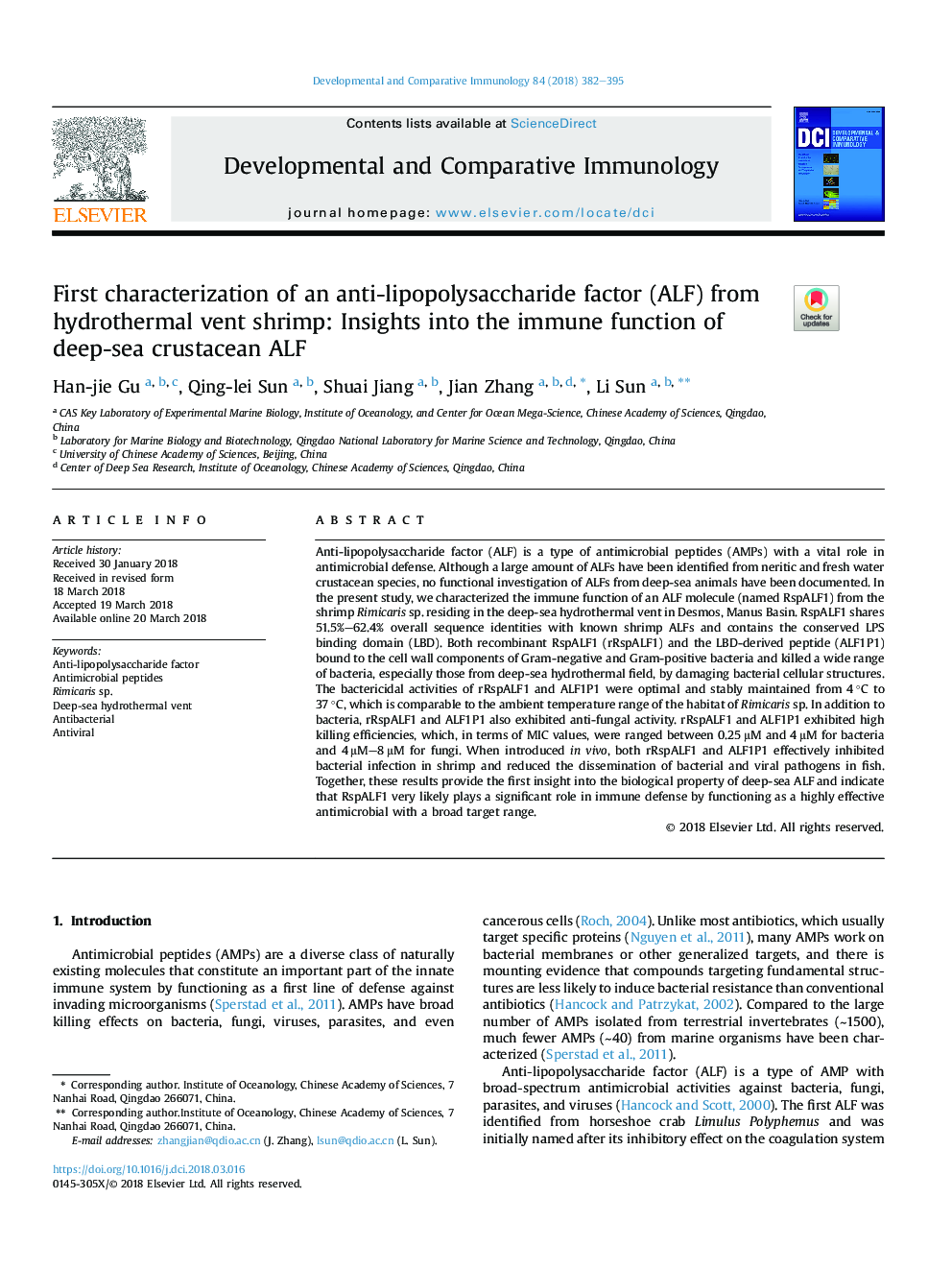| کد مقاله | کد نشریه | سال انتشار | مقاله انگلیسی | نسخه تمام متن |
|---|---|---|---|---|
| 8497743 | 1553548 | 2018 | 14 صفحه PDF | دانلود رایگان |
عنوان انگلیسی مقاله ISI
First characterization of an anti-lipopolysaccharide factor (ALF) from hydrothermal vent shrimp: Insights into the immune function of deep-sea crustacean ALF
دانلود مقاله + سفارش ترجمه
دانلود مقاله ISI انگلیسی
رایگان برای ایرانیان
کلمات کلیدی
موضوعات مرتبط
علوم زیستی و بیوفناوری
بیوشیمی، ژنتیک و زیست شناسی مولکولی
زیست شناسی تکاملی
پیش نمایش صفحه اول مقاله

چکیده انگلیسی
Anti-lipopolysaccharide factor (ALF) is a type of antimicrobial peptides (AMPs) with a vital role in antimicrobial defense. Although a large amount of ALFs have been identified from neritic and fresh water crustacean species, no functional investigation of ALFs from deep-sea animals have been documented. In the present study, we characterized the immune function of an ALF molecule (named RspALF1) from the shrimp Rimicaris sp. residing in the deep-sea hydrothermal vent in Desmos, Manus Basin. RspALF1 shares 51.5%-62.4% overall sequence identities with known shrimp ALFs and contains the conserved LPS binding domain (LBD). Both recombinant RspALF1 (rRspALF1) and the LBD-derived peptide (ALF1P1) bound to the cell wall components of Gram-negative and Gram-positive bacteria and killed a wide range of bacteria, especially those from deep-sea hydrothermal field, by damaging bacterial cellular structures. The bactericidal activities of rRspALF1 and ALF1P1 were optimal and stably maintained from 4â¯Â°C to 37â¯Â°C, which is comparable to the ambient temperature range of the habitat of Rimicaris sp. In addition to bacteria, rRspALF1 and ALF1P1 also exhibited anti-fungal activity. rRspALF1 and ALF1P1 exhibited high killing efficiencies, which, in terms of MIC values, were ranged between 0.25â¯Î¼M and 4â¯Î¼M for bacteria and 4â¯Î¼M-8â¯Î¼M for fungi. When introduced in vivo, both rRspALF1 and ALF1P1 effectively inhibited bacterial infection in shrimp and reduced the dissemination of bacterial and viral pathogens in fish. Together, these results provide the first insight into the biological property of deep-sea ALF and indicate that RspALF1 very likely plays a significant role in immune defense by functioning as a highly effective antimicrobial with a broad target range.
ناشر
Database: Elsevier - ScienceDirect (ساینس دایرکت)
Journal: Developmental & Comparative Immunology - Volume 84, July 2018, Pages 382-395
Journal: Developmental & Comparative Immunology - Volume 84, July 2018, Pages 382-395
نویسندگان
Han-jie Gu, Qing-lei Sun, Shuai Jiang, Jian Zhang, Li Sun,